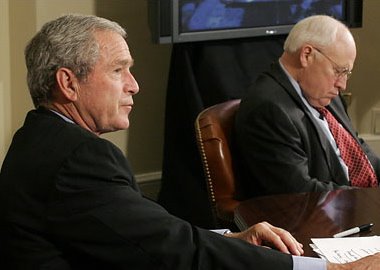Previously on "All Hell Is Breaking Loose":
Muslims are divided into Sunni and Shi'a, which is similar to the differences between Catholics and Protestants in Christianity. They generally don't like each other and think that the other side is worshipping all wrong.
Muslims are spread all over the world, but some countries are dominate in one or the other sect of Islam. Needless to say, countries that identify with one side are going to back up that side. To compare this to the familiar, Protestant countries like England and Catholic countries like Spain might feel the need to take sides in a Catholic/Protestant conflict. Catholic countries like Mexico, while an ocean away, might feel a camaraderie with their Catholic brethren in Ireland even though culturally they have little in common.
So, who's who? Well, as Wikipedia points out, the Shi'a are kind of the proverbial "red-headed stepchild" of Islam. "One of the lingering problems... in estimating the Shi'a population is that unless the Shi`a form a significant minority in a Muslim country, the entire population is often listed as Sunni... No Sunni-Shi'a breakdown is available for many countries... This is certain to have exaggerated the proportion of Sunni Muslims." It's like the way the US is considered a Protestant country even though there are a lot of Catholics here, certainly enough to make a political impact, as we saw in the recent immigration debate.
Another great example is Iraq. Under Saddam, the country was considered to be Sunni because Saddam and his government were Sunni (though it seems they had lapsed into secularism). As we found out when we cracked Iraq open, it turns out that most of the actual people inside were Shi'a.
Wikipedia is saying that the conventional wisdom breaks it down 85% Sunni and 15% Shi'a, even though because of the problems listed above, that's probably not right.
What's happening in the world is the rift between these two sects is growing and becoming more violent. It seems that when this really ignites, nation-states are going to take sides. So, who sides with whom?
Out of the major players on the world's stage who are predominately Muslim, it breaks down (as far as I can tell, with Wikipedia's help--they have an awesome chart-- and accepting the above disclaimer) like this:
SUNNI
Somalia
Saudi Arabia
Turkey
Yemen
Kuwait
Afghanistan
Libya
Pakistan
United Arab Emirates
Egypt
Jordan
Syria
Indonesia
SHI'A
Bahrain
Iran
Iraq
Out of the countries that aren't predominately Muslim, but have significant (60-75%) Muslim populations, their Muslims break down like this:
SUNNI
Sudan
Albania
Bosnia Herzegovenia
SHI'A
Lebanon
If you're wondering about G8 countries like the US, all of their Muslims are listed as Sunni, probably because of the poor data collection mentioned earlier. (While Muslims might list their religion on US census forms, for example, I don't think it specifies "Sunni" or "Shi'a".)
So let's take a headline from the other day: "Saudi Arabia, Jordan, and Egypt issue a statement condemning Hezbollah's attack on Israel." While that seems significant, Arabs turning on Arabs instead of banding together in lockstep against Israel, look at the chart. Hezbollah is a Shi'a group from Shi'a Lebanon. Saudi Arabia, Jordan, and Egypt are all Sunni. Iran supports Hezbollah, and from a glance at the chart, that makes perfect sense. The Sunni Syrians, on the other hand, took over Shi'ite Lebanon until they were recently kicked out, which explains the animosity there. On the other hand, the Syrians aided Hezbollah in the past, because Hezbollah was formed to fight the Israelis, which despite their differences is something radicals of both groups can get behind. In fact, in this growing rift between Sunnis and Shi'a, the Israel/Hezbollah conflict may be the only thing keeping them together, as seen by the Syrians welcoming Shi'ite Lebanese refugees with open arms.
Iraq has become the hotbed of the conflict between the Sunni and the Shi'a. The Sunni dictatorship of Saddam allowed for Sunni abuse of the Shi'ite majority. (Well, let's face it, the Husseins were just downright sick puppies, and they happened to be Sunni and used that as an excuse.) The US came in and, through many missteps but I think with the idea of rooting for the underdog, ended up handing the country back to the Shi'a. Needless to say, after years of horror, the Shi'a are back and they're pissed, as the saying goes. That's why what is flippantly referred to in the MSM as "sectarian violence" has replaced any kind of insurgency in Iraq.
"I can't understand/ what makes a man/ hate another man," Depeche Mode once sang, and it is unfathomable why such a horror would occur unless you're a part of it. I still find it hard to believe that Ireland was torn apart by what we would now call "sectarian violence", when really, who cares who's Catholic or Protestant. But go into a pub in Ireland and ask that question, and you'll get an earful-- or, the patrons will narrow their eyes at you as if to say, "Idiot," and turn back to their Guinness without a word.
The Shi'a are back in Iraq with a vengeance, and are flooding into the police forces and military, from which position they are purportedly abusing and murdering Sunnis. Those that don't get jobs join gangs, which they euphamisitcally call "militias", and go around abusing and murdering Sunnis on their own. What a fun place.
Is it any wonder that the Sunnis in other countries are starting to get angry with the US for backing the Shi'a and putting them in power? And who exactly would be mad at us? Saudi Arabia, Jordan, Egypt, Syria, Afghanistan, and Turkey, for starters. At least four of those are our business partners and in recent years, friends of a sort, which would be a great loss to us if they should turn on us. Iran, for all of its saber-rattling and hatred of the US, is actually not doing as much as you might imagine to provoke us because on this greater sectarian battleground, we just helped them by creating another Shi'a country. (That's why people keep saying, "The big winner here is Iran," which doesn't really make any sense unless you understand the Shi'a/Sunni conflict.)
I don't have a profound point here, just wanted to get this all straight in my own head and hopefully help you out too. I do have a warning: keep an eye on these Sunni and Shi'a divisions, they will be key to understanding wide-spread conflict and (any God willing) resolution.
UPDATE:
Wow, talk about topicality: just took a look at Salon.com's political blog by Tim Grieve, who posted this:
The Bush administration has long insisted that news stories about violence in Iraq obscure the progress that is being made on the political front.
Perhaps it's time to put that story to rest.
In an extraordinarily gloomy report from Baghdad, Reuters correspondent Mariam Karouny says that Iraqi leaders have "all but given up on holding the country together." Among the ideas now on the table: Divide Baghdad into two zones, one for Shiites and one for Sunnis, in the hopes of stopping the bloodshed between the two.
The harsh words from one unnamed government official: "Iraq as a political project is finished."
I certainly hope that's not the case, since division is never the solution ("Mr. Gorbachev, tear down this wall!" Reagan) but I will say I understand all that a lot better having done all this research.






No comments:
Post a Comment